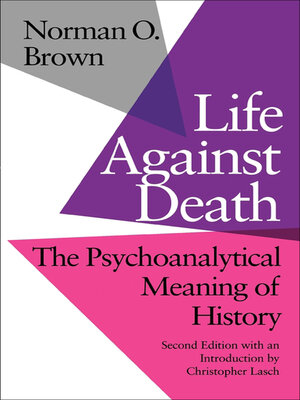
Sign up to save your library
With an OverDrive account, you can save your favorite libraries for at-a-glance information about availability. Find out more about OverDrive accounts.
Find this title in Libby, the library reading app by OverDrive.



Search for a digital library with this title
Title found at these libraries:
| Library Name | Distance |
|---|---|
| Loading... |
A shocking and extreme interpretation of culture, history, and the father of psychoanalysis.
In Life Against Death: The Psychoanalytical Meaning of History, social philosopher Norman O. Brown radically analyzes and critiques the work of Sigmund Freud. Brown attempts to define a non-repressive civilization, draws parallels between psychoanalysis and the theology of Martin Luther, and also examines the revolutionary themes present in western religious thought, such as ideas found in the work of William Blake and Jakob Böhme.
“Life Against Death cannot fail to shock, if it is taken personally; for it is a book which does not aim at eventual reconciliation with the views of common sense. The highest praise one can give to Brown’s book is that, apart from its all-important attempt to penetrate and further the insights of Freud, it is the first major attempt to formulate an eschatology of immanence in the seventy years since Nietzsche.” —Susan Sontag
“One of the most interesting and valuable works of our time. Brown’s contribution to moral thought . . . cannot be overestimated. His book is far-ranging, thoroughgoing, extreme, and shocking. It gives the best interpretation of Freud I know.” —Lionel Trilling
In Life Against Death: The Psychoanalytical Meaning of History, social philosopher Norman O. Brown radically analyzes and critiques the work of Sigmund Freud. Brown attempts to define a non-repressive civilization, draws parallels between psychoanalysis and the theology of Martin Luther, and also examines the revolutionary themes present in western religious thought, such as ideas found in the work of William Blake and Jakob Böhme.
“Life Against Death cannot fail to shock, if it is taken personally; for it is a book which does not aim at eventual reconciliation with the views of common sense. The highest praise one can give to Brown’s book is that, apart from its all-important attempt to penetrate and further the insights of Freud, it is the first major attempt to formulate an eschatology of immanence in the seventy years since Nietzsche.” —Susan Sontag
“One of the most interesting and valuable works of our time. Brown’s contribution to moral thought . . . cannot be overestimated. His book is far-ranging, thoroughgoing, extreme, and shocking. It gives the best interpretation of Freud I know.” —Lionel Trilling







